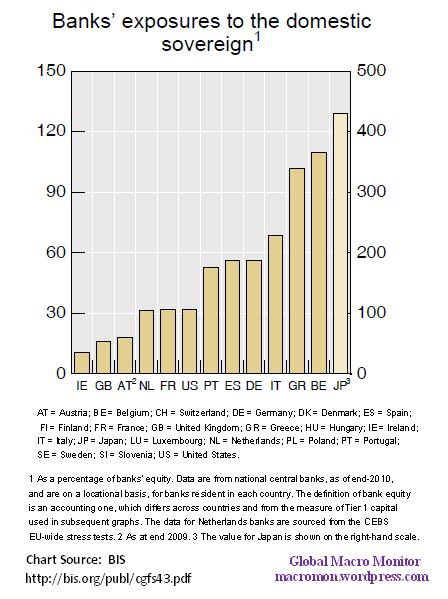Here at the Global Macro Monitor we perceive a rapidly changing financial landscape. The concept of risk-free is being redefined as we write and analysts are now forced to look at the systemic risk caused by a banking system’s exposure to their domestic sovereign. This, not in Ecuador, but now in the core of Western Europe!
The BIS released a report today that included the following chart, which we thought was very interesting and relevant to today’s market. It measures the percentage of equity capital each country’s banking system is exposed to the domestic sovereign. Italy’s banks, for example, have more than 60 percent of their equity exposed to the government, which partially explains how the sovereign finances such a large portion of its deficits internally.
As the perceived credit risk of the Italian government increases, however, the banks, who are highly exposed, will likely reduce their holdings and willingness to purchase new bonds or debt, thus leading to a potential domestic buyers strike. This is how a downward spiral develops, which, if not aggressively addressed can lead to a sovereign funding crisis. The feedback between the financial sector and the sovereign further complicates the policy response. Reuters writes,
But while a wide range of investors had sold bonds, the major driver behind the moves was a lack of domestic Italian institutions willing to buy the paper on offer forcing banks to mark their prices lower, traders said.
“What we’ve seen in the crisis so far when we have the big widening moves is the Italian domestics come in. we’ve seen an absence of them in the last week and reduced activity for the two weeks before that,” said Justin Knight, head of European rates strategy at UBS in London. Domestic demand could be shrinking due to a number of technical factors, analysts said.
The same is true with Japan. However, Japanese banks’ exposure to the government is in a different universe and is illustrated on the right axis. Now can you guess who has been financing Japan’s massive fiscal deficits?
Let’s hope our leaders in Washington have their “Sputnik moment” very soon as they watch Europe come unraveled over fiscal and debt mismanagement. Is it possible both parties can have an epiphany about the current fragility of market confidence in highly indebted sovereign borrowers and how difficult it is to regain that confidence? In the next 11 days and with a sub-3 percent 10-year bond yield?
(click here if chart is not observable)



What's been said:
Discussions found on the web: